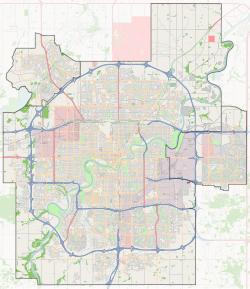Mill Woods Town Centre, Edmonton
Mill Woods Town Centre | |
|---|---|
Neighbourhood | |
Location of Mill Woods Town Centre in Edmonton | |
| Coordinates: 53°27′22″N 113°25′41″W / 53.456°N 113.428°W | |
| Country | |
| Province | |
| City | Edmonton |
| Quadrant[1] | NW |
| Ward[1] | Karhiio |
| Sector[2] | Southeast |
| Area[3][4] Community | Mill Woods Mill Woods Town Centre |
| Government | |
| • Mayor | Amarjeet Sohi |
| • Administrative body | Edmonton City Council |
| • Councillor | Keren Tang |
| Area | |
• Total | 0.52 km2 (0.20 sq mi) |
| Elevation | 691 m (2,267 ft) |
| Population (2012)[7] | |
• Total | 1,247 |
| • Density | 2,398.1/km2 (6,211/sq mi) |
| • Change (2009–12) | |
| • Dwellings | 689 |
Mill Woods Town Centre is best known for its shopping mall and is the commercial centre of the Mill Woods area of Edmonton, Alberta, Canada. What is less well known is that the mall is part of a larger neighbourhood with the same name. The larger neighbourhood is home to a sizable residential population of 1074 according to the 2005 municipal census.[8]
Mill Woods Town Centre is bounded on the north by 28 Avenue, on the south by 23 Avenue, on the west by 66 Street, and on the east by 50 Street. Hewes Way, a major thoroughfare, cuts the neighbourhood roughly in half.
Demographics
[edit]In the City of Edmonton's 2012 municipal census, Mill Woods Town Centre had a population of 1,247 living in 689 dwellings,[7] a 7.9% change from its 2009 population of 1,156.[9] With a land area of 0.52 km2 (0.20 sq mi),[6] it had a population density of 2,398.1 people/km2 in 2012.[6][7]
Residential development
[edit]
The neighbourhood's residential population lives in a mixture of rented apartments (38%) and apartment style condominiums (62%).[10] According to the 2001 federal census, all residential construction in the neighbourhood was built during the 1990s.[10]
The average household size is 1.7 persons. While there are a 55 three person households (8% of all households), most households in the neighbourhood is split between one person households (52%) and two person households (32%).[10]
Surrounding neighbourhoods
[edit]References
[edit]- ^ a b "City of Edmonton Wards & Standard Neighbourhoods" (PDF). City of Edmonton. Archived from the original (PDF) on December 16, 2011. Retrieved February 13, 2013.
- ^ "Edmonton Developing and Planned Neighbourhoods, 2011" (PDF). City of Edmonton. Archived from the original (PDF) on March 26, 2014. Retrieved February 13, 2013.
- ^ "The Way We Grow: Municipal Development Plan Bylaw 15100" (PDF). City of Edmonton. 2010-05-26. Archived from the original (PDF) on May 2, 2015. Retrieved February 13, 2013.
- ^ "City of Edmonton Plans in Effect" (PDF). City of Edmonton. November 2011. Archived from the original (PDF) on October 17, 2013. Retrieved February 13, 2013.
- ^ "City Councillors". City of Edmonton. Retrieved February 16, 2014.
- ^ a b c "Neighbourhoods (data plus kml file)". City of Edmonton. Retrieved February 13, 2013.
- ^ a b c "Municipal Census Results – Edmonton 2012 Census". City of Edmonton. Retrieved February 22, 2013.
- ^ "2005 Municipal Census - Population by Age and Gender" (PDF). City of Edmonton.
- ^ "2009 Municipal Census Results". City of Edmonton. Retrieved February 22, 2013.
- ^ a b c "Mill WoodsTown Centre" (PDF). Mill Woods Town Centre Neighbourhood Profile. City of Edmonton. Retrieved 8 May 2016.

